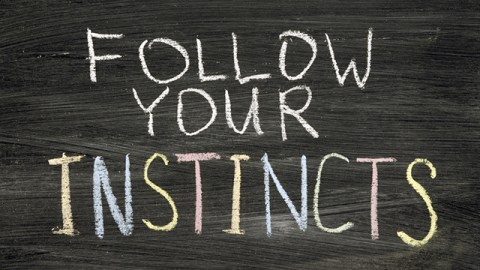The Distance Between Fear and Intuition

Long before Allen Ginsberg used the phrase ‘first thought, best thought’ to describe spontaneous, intuitive writing that seemed to spring unaware from ‘somewhere else,’ Buddhists had developed this maxim as a sort of cognitive umbilical cord to the unconscious. The underlying idea is that the first thought that springs into your head should be honored, and it is only the ‘thinking mind’ doubting that initial pot of mental gold, setting the thinker off into a spiraling sequence of self-doubt and frustration.
Intuition is often filed into the paranormal or supernatural bin, though today researchers are treating it differently. In 2012, the US Navy began making available $3.85 million for scientists to investigate how intuition works—not the psychic shades of foresight, mind you, but the ‘Spidey sense’ that has helped soldiers thwart bombings and sieges. Navy personnel are betting that if this skill can come in handy during wartime, it is worth exploring.
What we term intuition is common: a subtle rise in blood pressure, a lightness (or knot) in the pit of our stomach, a tinge underneath our eyelids, the sense of foreboding as we enter a room. Often we assume that existence is sending us a signal to watch out, prepare and, sometimes, duck. Unfortunately intuition tends to be wrong as often as right. Defining what it actually is, or what function it serves, may still be far off in the future.
Some would argue that it needn’t be studied, just ‘experienced.’ Rather than debate whether or not intuition exists and what function it serves, there is something more basic and primal to explore: the relationship between hopeful projection and unresolved fear.
Human beings are storytelling animals. As literary scholar Jonathan Gottschall writes in The Storytelling Animal, our craving for story serves no biological purpose, but rather it is our brains that contain ‘glitches in its design that make it vulnerable to story.’ He argues that religion is the ‘ultimate expression of story’s dominion over our minds,’ and demonstrates how our brains continually create patterns where none exist in order to force a narrative.
Beyond the New Age lingo that what we project becomes reality—a starving man cannot simply project food into existence, or there would be no nutritional poverty on the planet—lies a truer idea: If we allow our fears to dominate our minds as we progress through life, we will act in a guarded manner emotionally and mentally, thus creating the circumstances for those fears to manifest. When they do, we’ll validate those fears by claiming we intuited them all along, not recognizing that we were the ones who tied the blindfold around our eyes in the first place.
This coincides with Gottschall’s research. Religious texts and, more importantly, those who believe them to be true, are forcing a narrative onto existence, whether or not it has anything to do with what is actually happening in the world. We create a story out of our fears and desires, and woe be unto any in our way.
There is a lesson in every experience we encounter, and when we run into the same patterns over and over—what the Indians call samsara, or, more specifically regarding mental patterns, samskaras—the freedom to escape our endless cycles lies in a psychological shift in perception. This is no easy task, for it asks us to stop letting fear dictate reality.
The challenge lies in understanding the difference between projecting desires and relying on intuition as a guiding tool. This is where fear comes into play—our desires will always be tainted by past experiences, which we project forward as the basis of understanding reality. As I’m writing this column, a friend tweeted this quote attributed to Abraham Lincoln:
If we magnified our successes as much as we magnify our disappointments we’d all be much happier.
Yet it is our disappointments that serve as the basis of our fears, the idea that we’ll continue running into the same failures over and over. This tendency taints our application of intuition: the same stomach gurgle that we believe offers foresight is a habitual pattern wearing a different mask, one which will help create the result we feared all along.
How to proceed? If I had an answer, I wouldn’t be writing a column asking the question. But I do have stock in is this George S Patton quote:
Courage is fear holding on a minute longer.
Or, as one of my religion professors at Rutgers used to say,
Courage is not not having fear. It’s recognizing fear and moving forward despite it.
Perhaps in this cognitive space, where habitual patterns of failure and fatigue are no longer guiding us, intuition can become a useful device—not a mystical tool offered by the gods, but a function of this amazing organ we can’t fully comprehend pointing in a direction that may just change our lives…sometimes into love, sometimes to duck.
Image: YuryZap/shutterstock.com





